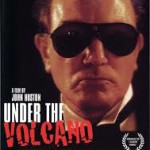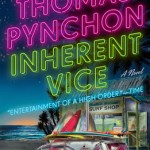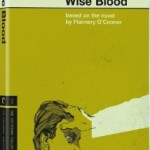I recently saw, on DVD, Wise Blood, the movie based on a novel by Flannery O’Connor. Criterion has reissued this 1979 gem, all cleaned up, and with annotations and interviews for context.
The movie increased my respect for O’Connor. I haven’t read any of her novels, a few stories in high school is all, but as a rule, I am allergic to “Southern Gothic.” I’ve never found it interesting to watch stupid people behaving stupidly. However this story was exceptional.
I loved the idea of a young man who wants to cynically start the Church of Jesus Christ, to make a living as a preacher, but his church will be without the Jesus Christ, who was a fraud, he says.
In his own angry desperation to find meaning, he finds it necessary to become something beyond what he is. It’s the old hound of heaven. The ideas track Moby Dick and the imagery tracks Oedipus Rex. Loved it.
 John Huston directed Wise Blood and also directed a movie adaptation of Malcolm Lawrie’s Under the Volcano. I was perplexed by that novel, of a drunken regional governor Mexico around the time of the Spanish Civil War in Europe. The novel is known for the narrator’s relentless adherence to the governor’s mind, even during his drunken delusions. It is an “experience.” In the movie, Albert Finney does a good drunk, but overall the movie seemed flat, compared to the rich interiority of the novel. You have to give Huston points for even attempting to make that movie however.
John Huston directed Wise Blood and also directed a movie adaptation of Malcolm Lawrie’s Under the Volcano. I was perplexed by that novel, of a drunken regional governor Mexico around the time of the Spanish Civil War in Europe. The novel is known for the narrator’s relentless adherence to the governor’s mind, even during his drunken delusions. It is an “experience.” In the movie, Albert Finney does a good drunk, but overall the movie seemed flat, compared to the rich interiority of the novel. You have to give Huston points for even attempting to make that movie however.
 I can also recommend Gemma Bovery (2014). It’s set in contemporary rural France and the plot points follow Flaubert’s novel, Madam Bovary, and the characters are vaguely aware of that, as is the viewer, of course. But what’s amazing is that the movie also manages to capture Flaubert’s innovations in narration, including the moves between omniscient and close third and even demonstrating Free Indirect Discourse (which he invented). The director (Ann Fontaine; also co-wrote) understood the novel well.
I can also recommend Gemma Bovery (2014). It’s set in contemporary rural France and the plot points follow Flaubert’s novel, Madam Bovary, and the characters are vaguely aware of that, as is the viewer, of course. But what’s amazing is that the movie also manages to capture Flaubert’s innovations in narration, including the moves between omniscient and close third and even demonstrating Free Indirect Discourse (which he invented). The director (Ann Fontaine; also co-wrote) understood the novel well.
It’s a great-looking picture besides, with the warm glow of Southern France that recalled the look and feel of “My Mother’s Glory” and “My Father’s Mansion” a couple of 1990 films by Yves Robert that I have always admired. And I love to hear French – such a beautiful language.
 Finally, I recently viewed the movie of Thomas Pynchon’s Inherent Vice. The movie tracks the novel very closely, though leaving out great chunks of subplot and backstory, as is necessary. Joaquin Phoenix does a good job as the stoned out detective, Doc Sportello, who is supposed to be a 1970’s parody of Chandler’s Philip Marlowe. Josh Brolin is perfect as Bigfoot, the cop known for kicking in doors. The cast includes some surprises, from Owen Wilson to Maya Rudolph, Reese Witherspoon, Benicio del Toro and Martin Short. Despite all that talent, the movie is just not as funny as the book and ends up being more slapstick than ironic. Pynchon’s humor seeps out of his exaggerated sentences, which are often too fast and complicated to sink in from the screen. Still, the movie is wacky and over-the-top, as is the novel, so a success for that.
Finally, I recently viewed the movie of Thomas Pynchon’s Inherent Vice. The movie tracks the novel very closely, though leaving out great chunks of subplot and backstory, as is necessary. Joaquin Phoenix does a good job as the stoned out detective, Doc Sportello, who is supposed to be a 1970’s parody of Chandler’s Philip Marlowe. Josh Brolin is perfect as Bigfoot, the cop known for kicking in doors. The cast includes some surprises, from Owen Wilson to Maya Rudolph, Reese Witherspoon, Benicio del Toro and Martin Short. Despite all that talent, the movie is just not as funny as the book and ends up being more slapstick than ironic. Pynchon’s humor seeps out of his exaggerated sentences, which are often too fast and complicated to sink in from the screen. Still, the movie is wacky and over-the-top, as is the novel, so a success for that.

